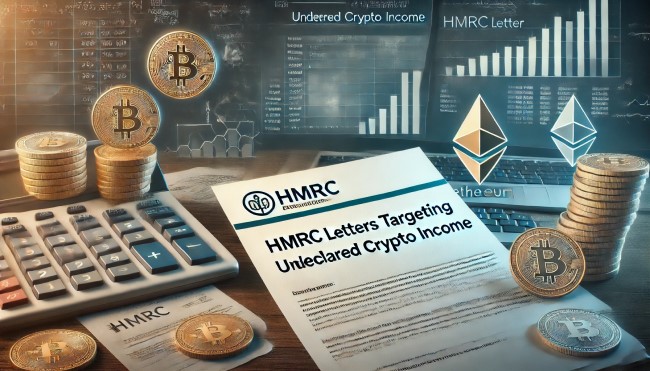HMRC Letters Target Undeclared Crypto Income: A Comprehensive Guide

With the surge in cryptocurrency investments, tax authorities worldwide are intensifying their focus on crypto-related financial activities. The UK’s HM Revenue & Customs (HMRC) is no exception, as it actively targets undeclared crypto income. This article explores how HMRC’s measures impact crypto holders, the implications of non-compliance, and essential steps to ensure adherence to tax regulations.
Why HMRC is Targeting Cryptocurrency Income
The growth of digital assets has significantly transformed the financial landscape, introducing new challenges in taxation. Cryptocurrencies, due to their decentralized and often anonymous nature, have made it difficult for tax authorities to track income and enforce tax laws effectively. To bridge this gap, HMRC has adopted advanced strategies, including issuing targeted letters aimed at identifying individuals who have not declared their crypto-related earnings.
These letters serve as a “nudge” strategy, prompting taxpayers to review their financial declarations and report any discrepancies. By sending these reminders, HMRC seeks to increase tax compliance without resorting to immediate legal action.
The Contents of HMRC’s Crypto Letters
The letters sent by HMRC are detailed and instructive. Here’s what recipients can typically expect:
- Notification of Unreported Income: The letters inform recipients that their crypto activities have potentially generated income that may not have been reported in their tax filings.
- Request for Disclosure: HMRC encourages individuals to disclose any undeclared income voluntarily, thereby avoiding severe penalties or legal repercussions.
- Guidance for Reporting: The correspondence often provides instructions on how to amend previous tax returns and properly document crypto earnings.
These communications are not accusations but rather warnings, urging individuals to correct or clarify their tax records before HMRC proceeds with more rigorous enforcement.
How HMRC Gathers Data on Crypto Transactions
To accurately identify non-compliant taxpayers, HMRC collaborates with cryptocurrency exchanges and other digital financial institutions. Under UK regulations, major exchanges like Coinbase, Binance, and Kraken are required to disclose user data. This enables HMRC to cross-reference reported income with actual transaction data.
Additionally, blockchain analysis tools help HMRC trace transactions across different wallets, linking them to known identities and determining potential tax liabilities. This level of data gathering underscores the seriousness with which HMRC approaches undeclared crypto income.
Tax Implications for Crypto Transactions
Crypto assets are treated differently depending on the nature of the transaction:
- Capital Gains Tax (CGT): Applies to profits made from the sale or exchange of crypto assets. Taxpayers must report gains exceeding the annual CGT allowance.
- Income Tax: Some transactions, such as crypto mining or staking, may be considered as earning income and subject to income tax and National Insurance contributions.
The tax rate varies based on an individual’s income bracket, making accurate reporting essential to avoid potential discrepancies.
Consequences of Non-Compliance
Failing to disclose crypto income can have serious consequences:
- Financial Penalties: HMRC can impose fines ranging from a percentage of the undeclared tax to full payment, plus interest.
- Legal Repercussions: In severe cases, non-compliance can lead to prosecution and imprisonment.
- Reputational Damage: Public cases involving non-compliance can damage an individual’s financial and personal reputation.
It’s vital for taxpayers to take these measures seriously, as penalties for willful tax evasion are considerably harsher than those for unintentional errors.
How to Ensure Compliance with HMRC Regulations
Crypto holders should follow these steps to ensure their tax records are accurate and compliant:
- Maintain Comprehensive Records: Document every transaction meticulously, including the type of transaction, dates, and values in both cryptocurrency and GBP.
- Use Crypto Tax Software: Utilize specialized tax tools that automate tracking, calculations, and reporting to streamline tax preparation.
- Consult a Tax Professional: A tax advisor experienced in cryptocurrency can provide personalized advice and ensure that all filings meet HMRC standards.
- Stay Updated: Cryptocurrency regulations evolve quickly. Keeping informed about HMRC’s latest updates will help maintain compliance and adapt to any changes.
Final Thoughts
The increasing scrutiny from HMRC regarding undeclared crypto income emphasizes the importance of transparency and accuracy in reporting digital asset transactions. As cryptocurrency becomes more integrated into mainstream financial activities, compliance with tax laws will remain a key concern for crypto investors. Being proactive, maintaining thorough records, and consulting with professionals can help avoid unnecessary complications and secure a stress-free tax filing process.
Taxpayers who receive HMRC’s nudge letters should respond promptly and address any discrepancies to safeguard against potential penalties and ensure that their crypto journey aligns with the regulations.



